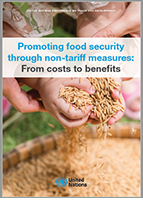
Food insecurity has been increasing dramatically. In 2022, 258 million people in 58 countries faced acute food insecurity, an increase of 34 per cent from the previous year.
Trade can be an important enabler of economic development and the smooth flow of agricultural trade is a necessary condition for food security. Non-tariff measures (NTMs) are policy measures other than tariffs that can have an impact on trade.
While some NTMs are employed as instruments of commercial policy, others stem from non-trade policy objectives (e.g. food safety and environmental protection). However, even legitimate and non-discriminatory NTMs with non-trade objectives have important restrictive and distorting effects on international trade, which particularly impact developing and least developed countries as well as the agri-food sectors.
The objective of this report is to decrypt these complex linkages across the four pillars of food security: accessibility, availability, stability, and utilization.
It quantifies impacts and offers solutions.
Section 2 identifies different types of non-tariff measures and present quantitative evidence of their incidence.
Section 3 maps out the multidimensional linkages between non-tariff measures and food security.
Section 4 looks at policy actions at the national, regional and multilateral levels to tilt the balance between costs and benefits towards a positive impact on food security.
Section 5 concludes.
The Annex presents a methodology to measure regulatory convergence and estimates the impacts on agri-food trade flows.




